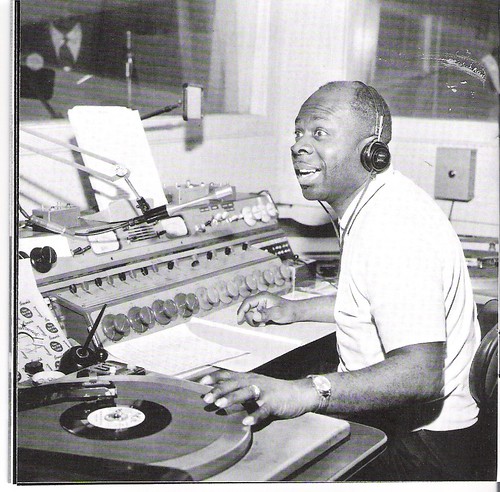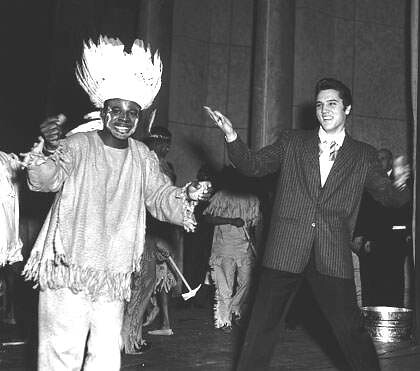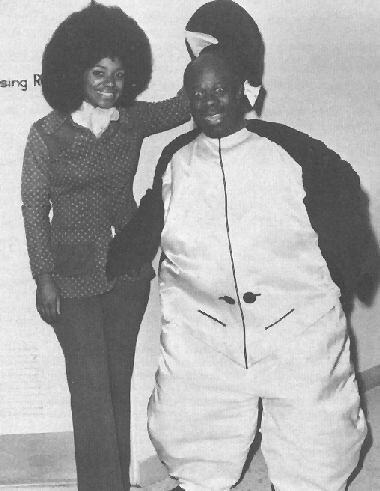 Why was Rufus Thomas obsessed with animals? I have looked and looked, and I come to you today with no answers, only questions. And that's the thing about Rufus. Born in 1917 but not famous outside Memphis until the early 1960s, and a major factor in the early successes on Sun and Stax Records, two of the most influential labels in American history, Rufus Thomas bridged two eras in popular music, but never truly became a star in either. The first of the two "Honky Tonk Heroes" in Guralnick's book to have worked exclusively outside the honky tonk milieu (well, not really, if you're flexible on your terminology--the man worked the tent shows, dance halls, jook joints, and "Chitlin' circuit" venues, which Guralnick would probably be quick to point out, weren't all that different from "honky tonks" in most ways), Thomas's career is a pretty efficient metaphor for the creation of rock & roll and soul, and makes him the paradigmatic Memphis man.
Why was Rufus Thomas obsessed with animals? I have looked and looked, and I come to you today with no answers, only questions. And that's the thing about Rufus. Born in 1917 but not famous outside Memphis until the early 1960s, and a major factor in the early successes on Sun and Stax Records, two of the most influential labels in American history, Rufus Thomas bridged two eras in popular music, but never truly became a star in either. The first of the two "Honky Tonk Heroes" in Guralnick's book to have worked exclusively outside the honky tonk milieu (well, not really, if you're flexible on your terminology--the man worked the tent shows, dance halls, jook joints, and "Chitlin' circuit" venues, which Guralnick would probably be quick to point out, weren't all that different from "honky tonks" in most ways), Thomas's career is a pretty efficient metaphor for the creation of rock & roll and soul, and makes him the paradigmatic Memphis man. Thomas started out in late-era minstrel tent shows in the late 1930s, but by the early 1940s he was a fixture on the Memphis music scene, hosting a popular amatuer show at the Palace Theater, and featuring B.B. King and Bobby "Blue" Bland. He held down a radio show on the celebrated radio station WDIA, the most influential station in the South to feature black performers and on-air talent, and later, the first programmed by African-Americans (Now, sadly, it plays what its management refers to as "light urban"). As Guralanick reports it, he was a one-man racial divide wrecking-crew (which, given the themes we've discussed thus far, would seem to be why he's included in this section)--an Opry fan hosting a show on a Black radio station, but also the "first black jock in the city playing the Beatles and the Rolling Stones" (p. 62). He sang and performed locally, cutting a few sides in the 1940s, but his first hit (and one of Sam Phillips' first Sun Singles) was "Bear cat," a response record to Big Mama Thornton's "Hound Dog" (#3, R&B). This was the transitional moment, in both my telling and Guralinick's--the birth of his obsession with animal songs (me), and the beginning of Sun's move to white artists, at the literal and figurative expense of performers like Rufus Thomas (Guralnick).
Thomas started out in late-era minstrel tent shows in the late 1930s, but by the early 1940s he was a fixture on the Memphis music scene, hosting a popular amatuer show at the Palace Theater, and featuring B.B. King and Bobby "Blue" Bland. He held down a radio show on the celebrated radio station WDIA, the most influential station in the South to feature black performers and on-air talent, and later, the first programmed by African-Americans (Now, sadly, it plays what its management refers to as "light urban"). As Guralanick reports it, he was a one-man racial divide wrecking-crew (which, given the themes we've discussed thus far, would seem to be why he's included in this section)--an Opry fan hosting a show on a Black radio station, but also the "first black jock in the city playing the Beatles and the Rolling Stones" (p. 62). He sang and performed locally, cutting a few sides in the 1940s, but his first hit (and one of Sam Phillips' first Sun Singles) was "Bear cat," a response record to Big Mama Thornton's "Hound Dog" (#3, R&B). This was the transitional moment, in both my telling and Guralinick's--the birth of his obsession with animal songs (me), and the beginning of Sun's move to white artists, at the literal and figurative expense of performers like Rufus Thomas (Guralnick). But this was not the end for Rufus. He continued his radio work, gigged out locally and toured, and when he and his daughter Carla (yes, that Carla Thomas) recorded a duet for a local record label, Satellite, its success led to wider distribution of Rufus's work and a new name for his label--Stax. He spent the rest of his career playing off the success he had in 1963 with his seminal dance hits, "The Dog" and "Walking the Dog" by touring and playing festivals, recording a number of minor dance hits (nearly always prefaced in name with the phrase "Do the Funky" and suffixed with the name of an animal), and eventually settling into a groove as a local Memphis legend and periodically recording for late-model blues labels like Alligator. He passed in 2001 (but this week, we're forgoing headstone pictures in favor of animal pictures, in fitting tribute).
But this was not the end for Rufus. He continued his radio work, gigged out locally and toured, and when he and his daughter Carla (yes, that Carla Thomas) recorded a duet for a local record label, Satellite, its success led to wider distribution of Rufus's work and a new name for his label--Stax. He spent the rest of his career playing off the success he had in 1963 with his seminal dance hits, "The Dog" and "Walking the Dog" by touring and playing festivals, recording a number of minor dance hits (nearly always prefaced in name with the phrase "Do the Funky" and suffixed with the name of an animal), and eventually settling into a groove as a local Memphis legend and periodically recording for late-model blues labels like Alligator. He passed in 2001 (but this week, we're forgoing headstone pictures in favor of animal pictures, in fitting tribute).Why Rufus? Because he exemplifies two of Guralnick's unspoken main points--that black and white music were thoroughly intertwined before Elvis, and that certain crucial performers were living, breathing bridges between the traditions of musical performance and dissemination in the rural South prior to WWII, but also personified the very rise of rock and roll itself--the role of radio deejays and small labels, as well as the radical re-inventions in sound. All of what we're presenting here (constrained as we are by the text) is Rufus's later work (excepting "Bear cat"), but I imagine that with better ears than mine you can imagine how American pop went from the minstral show to "Do the Funky Chicken" in one move.
Oh, and that last sentence is not an attempt to denigrate Thomas's work or imply his stage act or his act is "modern minstrelry"--because it's not (even though when "Do the Funky Penguin" hit, he sometimes wore a giant penguin suit). He was simply a malleable performer able to work in a pop/soul vein to appeal to new audiences--just as the grittiest of delta bluesmen often performed (if rarely recorded) pop songs and sentimental music alongside their more "gritty" material.
 Take it away, Rufus...
Take it away, Rufus...Big Mama Thornton - Hound Dog
Rufus Thomas - Bear Cat
B.B. King - 3 o'Clock Blues
Rufus Thomas - The Dog
Rufus Thomas - Walking the Dog
Rufus Thomas - Do the Funky Chicken
Rufus Thomas - Push and Pull
Rufus Thomas - Do the Funky Penguin
Rufus and Charla Thomas - Cause I Love You
Carla Thomas - Gee Whiz
Posted by Brandon





No comments:
Post a Comment